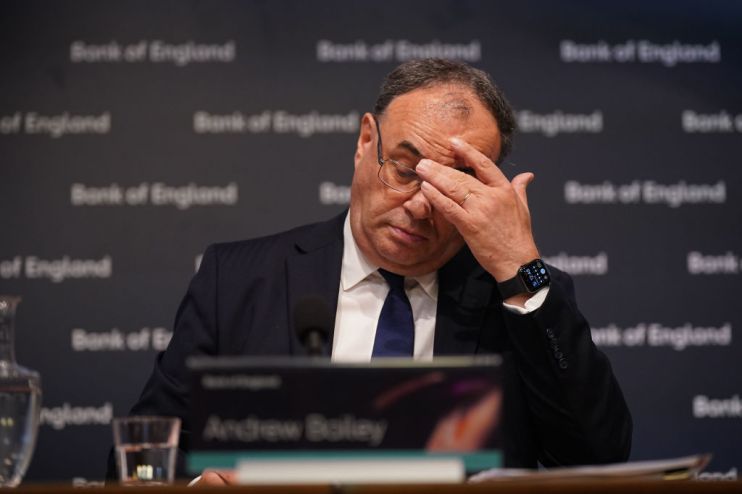Pound slides after Bank of England bats away emergency rate hike pressure

The Bank of England batted away the City’s bets on an emergency rate hike today to stem the pound’s losses against the US dollar.
In a statement issued late afternoon, the Bank’s governor Andrew Bailey said it will “make a full assessment” of the pound’s slide and the government’s borrowing and tax cutting splurge at its next meeting on 3 November and “act accordingly”.
He added the monetary policy committee (MPC) “will not hesitate” to hike rates steeply to get inflation, running at a 40-year high of 9.9 per cent, back to its two per cent target.
Bailey’s comments open the door for a super-sized rise of at least 75 basis points at the next meeting. They have already risen seven times in a row to 2.25 per cent.
Sterling had partially recovered from overnight losses in Asia in which it touched a record low of nearly $1.03 against the dollar before the statement, driven by investors betting on the Bank lifting borrowing costs suddenly.
Pound/US dollar exchange rate

It tumbled around two per cent and over one per cent against the dollar and euro respectively after the announcement.
Analysts at Nomura, an investment bank, said they expect the pound to fall below parity with the dollar by the end of this year and hit $0.95 in the first three months of 2023.
Moments before governor Bailey’s remarks, chancellor Kwasi Kwarteng sought to tame markets by confirming he will set out more details on his plan to boost UK growth on 23 November.
Measures will include cutting red tape and tweaking the childcare system, the Treasury said.
The Treasury also confirmed the Office for Budget Responsibility (OBR) will publish a new forecast on the state of the public finances and UK economy the same day.
The government did not ask the OBR to provide an assessment of last week’s mini-budget.
The intervention did little to settle markets, and the Bank may need to back up its words with “some actual action” such as an emergency rate rise if the pound continues to fall, Paul Dales, chief UK economist at Capital Economics, said.
The City thinks UK rates will climb to six per cent next year. But, the Bank may have to front-load rises, with traders baking in 175 basis points worth of hikes by November.
The MPC has never signed off an emergency rate rise since it was created 25 years ago.
Bets on rapidly rising rates have ramped up significantly since Kwarteng’s mini-budget last week.
Markets have ditched sterling in response to chancellor Kwasi Kwarteng last week launching the biggest tax cuts since 1972, worth £45bn, unleashing a short-term borrowing splurge.
The government could borrow more than £400bn than previously expected over the next four years to fund the tax cuts, according to the Resolution Foundation.
The chancellor and prime minister, Liz Truss, think their package will jolt the UK economy out of the mire and lift GDP growth.
Sterling lost over three per cent against the US dollar after the mini-budget was unveiled last Friday.
Steep rate hikes in America by the Federal Reserve have strengthened the dollar this year. The Fed has raised rates 300 basis points since March, the quickest tightening cycle since the 1980s.
The Bank of England has already hiked borrowing costs rapidly this year from a record low 0.1 per cent to 14-year high of 2.25 per cent.
Bailey and co lifted rates 50 basis points last week for the second time in a row.
However, fears over a tough UK recession and unstable public finances has whacked the pound.
Higher interest rates typically strengthen currencies by incentivising investors to buy assets denominated in said currency.
On a choppy day for UK assets, yields on UK debt skyrocketed, driven by investors demanding a higher return to swallow the big uptick in government borrowing.
Returns on the two-year gilt surged over 60 basis points to over 4.5 per cent, while the 10-year gilt, a benchmark for interest rates, climbed 40 basis points.
This means the government’s £45bn worth of tax cuts and energy support package will be costlier to fund.
Yields and prices move in opposite directions.
Lenders Halifax, Skipton and Virgin Money pulled mortgages with a fee to new customers due to market volatility.